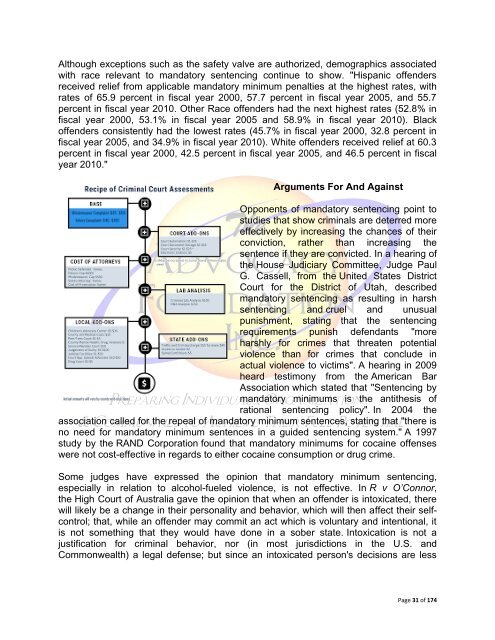The Cost Ineffectiveness of Mandatory Minimum Sentencing In The U.S.
The Cost Ineffectiveness of Mandatory Minimum Sentencing In The U.S.
The Cost Ineffectiveness of Mandatory Minimum Sentencing In The U.S.
- No tags were found...
You also want an ePaper? Increase the reach of your titles
YUMPU automatically turns print PDFs into web optimized ePapers that Google loves.
Although exceptions such as the safety valve are authorized, demographics associated<br />
with race relevant to mandatory sentencing continue to show. "Hispanic <strong>of</strong>fenders<br />
received relief from applicable mandatory minimum penalties at the highest rates, with<br />
rates <strong>of</strong> 65.9 percent in fiscal year 2000, 57.7 percent in fiscal year 2005, and 55.7<br />
percent in fiscal year 2010. Other Race <strong>of</strong>fenders had the next highest rates (52.8% in<br />
fiscal year 2000, 53.1% in fiscal year 2005 and 58.9% in fiscal year 2010). Black<br />
<strong>of</strong>fenders consistently had the lowest rates (45.7% in fiscal year 2000, 32.8 percent in<br />
fiscal year 2005, and 34.9% in fiscal year 2010). White <strong>of</strong>fenders received relief at 60.3<br />
percent in fiscal year 2000, 42.5 percent in fiscal year 2005, and 46.5 percent in fiscal<br />
year 2010."<br />
Arguments For And Against<br />
Opponents <strong>of</strong> mandatory sentencing point to<br />
studies that show criminals are deterred more<br />
effectively by increasing the chances <strong>of</strong> their<br />
conviction, rather than increasing the<br />
sentence if they are convicted. <strong>In</strong> a hearing <strong>of</strong><br />
the House Judiciary Committee, Judge Paul<br />
G. Cassell, from the United States District<br />
Court for the District <strong>of</strong> Utah, described<br />
mandatory sentencing as resulting in harsh<br />
sentencing and cruel and unusual<br />
punishment, stating that the sentencing<br />
requirements punish defendants "more<br />
harshly for crimes that threaten potential<br />
violence than for crimes that conclude in<br />
actual violence to victims". A hearing in 2009<br />
heard testimony from the American Bar<br />
Association which stated that "<strong>Sentencing</strong> by<br />
mandatory minimums is the antithesis <strong>of</strong><br />
rational sentencing policy". <strong>In</strong> 2004 the<br />
association called for the repeal <strong>of</strong> mandatory minimum sentences, stating that "there is<br />
no need for mandatory minimum sentences in a guided sentencing system." A 1997<br />
study by the RAND Corporation found that mandatory minimums for cocaine <strong>of</strong>fenses<br />
were not cost-effective in regards to either cocaine consumption or drug crime.<br />
Some judges have expressed the opinion that mandatory minimum sentencing,<br />
especially in relation to alcohol-fueled violence, is not effective. <strong>In</strong> R v O’Connor,<br />
the High Court <strong>of</strong> Australia gave the opinion that when an <strong>of</strong>fender is intoxicated, there<br />
will likely be a change in their personality and behavior, which will then affect their selfcontrol;<br />
that, while an <strong>of</strong>fender may commit an act which is voluntary and intentional, it<br />
is not something that they would have done in a sober state. <strong>In</strong>toxication is not a<br />
justification for criminal behavior, nor (in most jurisdictions in the U.S. and<br />
Commonwealth) a legal defense; but since an intoxicated person's decisions are less<br />
Page 31 <strong>of</strong> 174
















